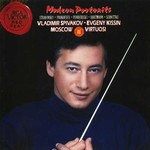
MARBECKS COLLECTABLE: Modern Portraits
 $30.00
Low Stock
add to cart
$30.00
Low Stock
add to cart
KARL HARTMANN / IGOR STRAVINSKY / KRZYSZTOF PENDERECKI / ALFRED SCHNITTKE / SERGEI PROKOFIEV
MARBECKS COLLECTABLE: Modern Portraits
Vladimir Spivakov (violin & director) / Moscow Virtuosi
[ RCA Victor Red Seal / CD ]
Release Date: Saturday 1 December 1990
"Try not to worry about the enigmatic title given to this collection; I have been for days, on and off, and there's no future in it. Thinking up a better one is a still more fruitless endeavour ('Attractive twentieth-century pieces that Vladimir Spivakov is fond of, which give solo opportunities to several other members of his orchestra but which cannot really be given the collective title ''Modern Concertos'' because of the presence of the Prokofiev and the inconvenient fact that the Schnittke Suite has lost some of its concerto-like qualities in Spivakov's arrangement of it' was the closest that I got: you see what I mean).
Karl Amadeus Hartmann's Concerto was apparently written as a sort of protest at the Nazi crushing of Czechoslovakia; its bitter, angry lyricism is mingled with solemnity and even a quality of aspiration by the submerged presence throughout of an old Hussite chorale and by the emergence in the finale of a 'companion' to that chorale, a Russian lament for the victims of oppression which Shostakovich used much later in his Eleventh Symphony. The outer movements have a grave poignancy (it also invades and somehow redeems the motoric, indeed rather Shostakovich-like but rather over-extended central scherzo) and an eloquent, always gratefully violinistic solo line that should have ensured for it by now a place on at least the outskirts of the concert repertory.
The Penderecki is a good piece, too: a deliberately fragmentary miniature oboe concerto that uses non-melodic elements as though they were 'themes' but has a simple motivic unity that readily unifies its obsessive fertility of invention. The Schnittke is a joke, I suppose, with a hint of a serious theme to it; or is it an innocent act of homage to the past, with a wry undercurrent of humour to make you doubt its sincerity? Whatever the case may be, it is a sequence of baroque pastiches, each with something faintly wrong to disturb the sub-Pergolesian suavity; a moment of strange, high drone, an out-of-style syncopation, an anachronistic accompaniment to a fugue. It all falls apart into frank, down-with-Albinonian-cliche parody at the end. The dead-pan wit, if that is what it is, is accentuated by the arrangement: originally for violin and keyboard, subsequently recast for viola d'amore and chamber ensemble, it is here scored for a straight (and straight-faced) 'classical' orchestra: oboes, horns, strings and a drolly spastic harpsichord. Very odd.
A very fine performance of the Stravinsky (crisp and precise, but with grace and real affection) and a nimble one of the Prokofiev, relishing the quirkness of the original sextet scoring, complete an entertaining programme. Cleanly and brightly recorded, too: recommended.'" Gramophone
Tracks:
Karl Amadeus Hartmann
Concerto funebre
Igor Stravinsky
Concerto in D
Krzysztof Penderecki
Capriccio
Alfred Schnittke
Suite in the Old Style
Sergei Prokofiev
Overture on Hebrew Themes, op. 34